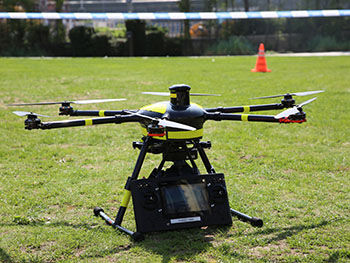University News Last updated 23 July 2018

We are living in the digital era, where we are faced with a constant stream of new, innovative technologies. As we embrace these new technologies into our lives and the cities we live in, the recurring question we as a society must continue to ask ourselves is: how can these technologies improve our quality of living and produce positive, societal growth? Birmingham City University’s Associate professor in IoT (Internet of Things), Dr Adel Aneiba, is one such individual who is exploring how we can utilise new technologies to enhance our living environment.
Adel is an active researcher who has already deployed long range (LoRa) gateways which utilise Low Power Wide Area Network (LPWAN) technology in Birmingham. These gateways provide smooth connectivity at a low and adaptive data rate and capture valuable data to understand how various forms of technology behave near us. These gateways make up “The Things Network” – a community which seeks to provide the entirety of Birmingham with Internet of Things data connectivity.
This research has led Adel to explore the use of drones and he is now researching the potential opportunities and challenges of drone operations in cities with West Midlands Combined Authority (WMCA) as part of Nesta’s Flying High Challenge. Nesta’s project researches how drones can be used to support public services and commercial opportunities in urban environments. The West Midlands is 1 of 5 areas to conduct the research with Bradford, London, Preston and Southampton also participating. The West Midlands is particularly well placed to produce insightful data for the project as Birmingham will play host to the Commonwealth Games in 2022 and see the development of HS2. These developments will significantly impact the city and this impact can be measured by drones. For example, drones can be used to help the police with security measures for large scale events or can measure levels of air pollution.
The project has also researched the environmental impact, logistics and safety of drone operations in an intricate, urban environment and examined what public attitudes are towards drones. Nesta conducted a survey in December 2017, and found that only around 30% of the public they surveyed felt that they had a good understanding of drones and their uses. However, they also discovered that exposure to drones tended to lead to a more positive perception. These results further prove why Adel’s research with Nesta is worth investing in as it will assist the tides of technological change by providing cities with the knowledge to choose the right kinds of technology to future proof city living.
As a faculty we are excited by how current students can get involved with this project and develop new skills. Adel has already sought out Computing students to connect their learning experience with real life technological exploration.
This cutting edge project really has the potential to improve city living and act as a rich learning experience for students of our Computing courses.